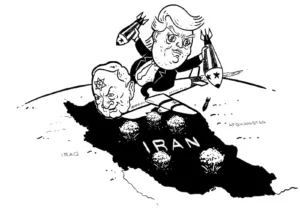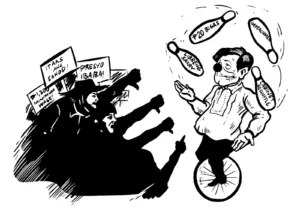By JOSE MARIA SISON
Chief Political Consultant
NDFP Negotiating Panel
Introduction to the NDFP Human Rights Monitoring Committee Booklet No. 6
It is of great importance and acute urgency that the Declaration of Undertaking to Apply the Geneva Conventions of 1949 and Protocol 1 of 1977, promulgated and issued by the National Democratic Front of the Philippines (NDFP) on July 5, 1996, is once more published and distributed more widely than ever before, together with related documents.
The Declaration of Undertaking asserts and makes clear that all the revolutionary forces and people represented by the NDFP within and outside the framework of peace negotiations with the Government of the Republic of the Philippines (GRP) are well-grounded in engaging the GRP in a civil war as a legitimate national liberation movement, that they have the status of co-belligerent under international law and that they assume rights and responsibilities under the Geneva Conventions and its protocols.
The Geneva Conventions of 1949 as the basic international instrument on the rules of armed conflicts seek to ameliorate the conditions of the wounded and sick of armed forces, the humane treatment of prisoners of war and the protection of civilian persons in time of war. Protocol I further expands these rules on the protection of civilian persons and populations in international armed conflicts while Protocol II aims to further protect victims of non-international armed conflicts.
The Declaration is done in accordance with Article 96, paragraph 3 of Protocol I which reads as follows:
“3. The authority representing a people engaged against a High Contracting Party in an armed conflict of the type referred to in Article 1, paragraph 4, may undertake to apply the Conventions and this Protocol in relation to that conflict by means of a unilateral declaration addressed to the depositary. Such declaration shall, upon its receipt by the depositary, have in relation to that conflict the following effects:
a. The Conventions and this Protocol are brought into force for the said authority as a Party to the conflict with immediate effect;
b. The said authority assumes the same rights and obligations as those which have been assumed by a High Contracting Party to the Conventions and this Protocol; and
c. The Conventions and this Protocol are equally binding upon all Parties to the conflict.”
The aforementioned Article 1, paragraph 4 reads as follows:
“4. The situations referred to in the preceding paragraph include armed conflicts in which peoples are fighting against colonial domination and alien occupation and against racist regimes in the exercise of their right of self-determination, as enshrined in the Charter of the United Nations and the Declaration of Principles of International Law concerning Friendly Relations and Cooperation among States in accordance with the Charter of the United Nations.”
The preceding paragraph reads as follows:
“3. This Protocol, which supplements the Geneva Conventions of 12 August 1949 for the protection of war victims, shall apply in the situations referred in Article 2 common to those Conventions.”
Common Article 2 provides that the Conventions apply to all cases of declared war.
Upon the establishment of the New People’s Army on March 29, 1969, the Communist Party of the Philippines issued a declaration of a protracted, concerted and sustained people’s war against the GRP and the semi-colonial and semifeudal ruling system on the ground that US imperialism and the GRP as puppet government violated the people’s right to national self-determination and democratic rights and oppressed the Filipino nation as a whole, including the national minorities.
To cap all his previous bellicose declarations, Marcos declared martial law and all-out war against the revolutionary forces on September 21, 1972. To use the Anti-Subversion Law, he accused them of acting in cooperation with foreign powers and ordered the regular armed forces to undertake offensives. In fact, he collaborated with a foreign power, the US, in violating Philippine territorial integrity by allowing US military forces to occupy large areas as bases and to commit crimes with impunity in and out of said bases.
The 1996 NDFP Declaration of Undertaking points clearly to the persistent factors and elements of colonial domination and national oppression, including chauvinism and racism, victimizing the entire Filipino nation and particular minorities in the Philippines. The persistent foreign domination and national oppression are carried out through the puppet instrumentation of the GRP and under unequal agreements with the US. The civil war has definite internationalized aspects because of overt and covert US military intervention and US military supplies to the GRP.
Long before the aforesaid NDFP Declaration, the revolutionary forces and people represented by the NDFP have acquired over the years the status of belligerency through revolutionary armed struggle. The revolutionary forces include the organs of democratic power established under the Guide for Establishing the People’s Democratic Government, the Communist Party of the Philippines as the leading party and political authority, the New People’s Army as the disciplined nationwide fighting force having a responsible political command and the mass organizations and alliances within the NDFP.
Since 1968, there have been two governments in the Philippines. One is the US-controlled puppet government of the big comprador bourgeoisie and the landlord class. The other is the government of the working class and peasantry with its own legal and judicial system and rules in accordance with its political principles and circumstances. The former is ever losing ground because it is oppressive and exploitative. The latter is ever growing because it fights for the national and social liberation of the Filipino people.
The NDFP Declaration of Undertaking which was sent to the Swiss Federal Council as official depositary and transmitted to the International Committee of the Red Cross (ICRC) as official guardian of international humanitarian law is significant because it has raised to a new and higher level the efforts of the revolutionary government and movement represented by the NDFP to gain international diplomatic recognition for their status belligerency. Previously, the NDFP made a Declaration of Adherence to Common Article 3 and Protocol II of the Geneva Conventions on August 15, 1991. These declarations affirm the reality that the NDFP, in the exercise of its inherent right, is willing, ready and able to assume and is undertaking its own distinct duties and responsibilities in adhering, respecting and being bound by international humanitarian law.
In a manner of speaking, the NDFP has accumulated points for the international diplomatic recognition of the revolutionary government and movement in the Philippines. The governments of The Netherlands, Belgium and Norway have acted as hosts and third party facilitators in the GRP-NDFP peace negotiations. The European Parliament recognized the aforesaid 1996 NDFP Declaration of Undertaking as an expression of good intention in a resolution in 1997 and the landmark 1998 Comprehensive Agreement on Respect for Human Rights and International Humanitarian Law (CARHRIHL) in one more resolution in 1999. The NDFP has also maintained and continues to conduct political and diplomatic relations with foreign friendly parties, organizations, and institutions and with some foreign governments and official agencies on a bilateral and multilateral basis independent of the GRP.
Under the CARHRIHL, the GRP itself has recognized the separate authority of the NDFP to take actions pertaining to suspected violators of human rights and international humanitarian law, who can be arrested, investigated and, if the evidence warrants, subjected to prosecution and trial.
But the US dictates upon the GRP to utter and do what is foolish and violative of agreements already mutually approved by principals in the GRP-NDFP peace negotiations. The GRP effectively declares that the US and other foreign governments have the sovereign right to trample on the mutually acceptable principle of national sovereignty of the Filipino people enshrined in The Hague Joint Declaration of 1992; use the “terrorist” label to deprive duly-authorized negotiators, consultants, staffers, security and other personnel who participate in the peace negotiations of necessary guarantees in the Joint Agreement on Safety and Immunity Guarantees (JASIG); and to negate the Hernandez judicial doctrine against criminalization of political acts or offenses.
The GRP also tramples on the basic democratic rights recognized in the CARHRIHL including the right to self-determination, due process, against discrimination on the basis of belief, freedom of thought and expression, freedom of conscience and the right not to be punished or held accountable in the exercise of these rights, right to free speech and association and the right to asylum.
In trying to misrepresent and demonize the revolutionary forces as “terrorist”, the US and the GRP wish to intimidate and pressure the NDFP to capitulate one way or the other. But the NDFP is not capitulating. It is rightfully demanding that the GRP comply with agreements already co-approved with the NDFP. By using the “terrorist” label to blackmail the NDFP, the US and the GRP are preventing the resumption of formal talks and are scuttling the peace negotiations.
The broad masses of the people in the Philippines and the world recognize how absurd and mendacious are the US and the GRP in seeking to demonize as “terrorist” the Filipino revolutionary forces and people that have so enthusiastically and wisely assumed duties and responsibilities under international human rights law and international humanitarian law and are demanding the resumption of formal talks in the peace negotiations in accordance with The Hague Joint Declaration, JASIG and Joint Agreement on the Formation, Sequence and Operationalization of the Reciprocal Working Committees.
The US is using the scheme of “permanent war on terror” in order to facilitate imperialist plunder, state terrorism and the super-terrorism of US military intervention and wars of aggression. The overweening arrogance and escalating rapacity and brutality of US imperialism and its puppets in the Philippines goad the Filipino people to intensify their resistance and to fight for their national and democratic rights.








